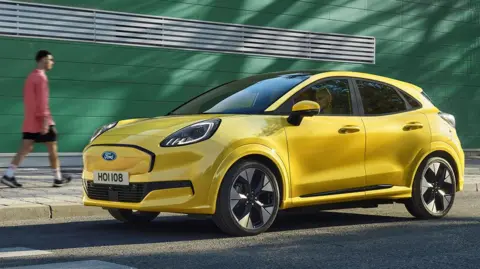Pritti MistryBusiness reporter, BBC News
 Ford
FordThe first electric vehicles (EV) eligible for the £3,750 discount under the government’s grant scheme have been announced.
The Department for Transport confirmed Ford’s Puma Gen-E or e-Tourneo Courier would be discounted as part of plans to encourage drivers to move away from petrol and diesel vehicles.
Under the grant scheme, the discount applies to new eligible car models costing up to £37,000, with the most environmentally friendly ones seeing the biggest reductions. Another 26 models have been cleared for discounts of £1,500.
Carmakers can apply for models to be eligible for grants, which are then automatically applied at the point of sale.
More vehicles are expected to be approved in the coming weeks and the DfT said the policy would bring down prices to “closely match their petrol and diesel counterparts”.
The government has pledged to ban the sale of new fully petrol or diesel cars from 2030.
But many drivers cite upfront costs as a key barrier to buying an EV and some have told the BBC that the UK needs more charging points. As a result EVs “don’t cut the mustard”, said Hugh Bladon, founding member of the Alliance of British Drivers.
He said hybrid cars were “the way forward” as they were more cost-effective than EVs and called for similar incentives for such vehicles.
According to Ford, the retail price for a new Puma Gen-E costs £26,245, while a petrol version is £26,580.
The grants to lower the cost of EVs will be funded through the £650m scheme, and will be available for three years.
There are around 1.3 million electric cars on Britain’s roads but currently only around 82,000 public charging points.
As well as how environmentally friendly the cars perform, manufacturers adopting the most sustainable and “greenest” methods during the production process, such as using 100% renewable electricity, stand a better chance of achieving eligibility for the maximum discount, the government said.
Full list of EVs eligible for the £1,500 discount
- Citroën ë-C3 and Citroën ë-C3 Aircross
- Citroën ë-C4 and Citroën ë-C4 X
- Citroën ë-C5 Aircross
- Citroën ë-Berlingo
- Cupra Born
- DS DS3
- DS N°4
- Nissan Ariya
- Nissan Micra
- Peugeot E-208
- Peugeot E-2008
- Peugeot E-308
- Peugeot E-408
- Peugeot E-Rifter
- Renault 4
- Renault 5
- Renault Alpine A290
- Renault Megane
- Renault Scenic
- Vauxhall Astra Electric
- Vauxhall Combo Life Electric
- Vauxhall Corsa Electric
- Vauxhall Frontera Electric
- Vauxhall Grandland Electric
- Vauxhall Mokka Electric
- Volkswagen ID.3
The up-front cost of EVs is higher on average than for petrol cars.
According to Autotrader, the average price of a new battery electric car was £49,790 in June 2025, based on manufacturers’ recommended prices for 148 models.
The equivalent for a petrol car was £34,225, but the average covers a broad range of prices.
Across all types of engines, sales of used cars outweigh those of brand new vehicles.
Figures from the Society of Motor Manufacturers and Traders show up to 7.6 million second-hand cars were purchased last year, compared to nearly two million brand new vehicles across all fuel types.
Transport Secretary Heidi Alexander said the grant scheme was making it “easier and cheaper for families to make the switch to electric”.
Edmund King, president of the AA, said drivers “frequently tell us that the upfront costs of new EVs are a stumbling block to making the switch to electric”.
“It is great to see some of these more substantial £3,750 discounts coming online because for some drivers this might just bridge the financial gap to make these cars affordable.”
Mike Hawes, chief executive of the Society of Motor Manufacturers and Traders (SMMT), said the government needed to ramp up the processing and assessment of applications for new EV models to be eligible for the scheme “to ensure the greatest possible choice for consumers and certainty for the market”.

